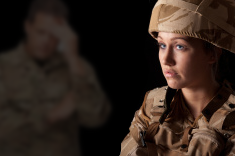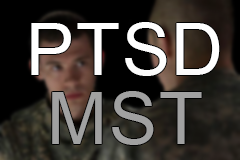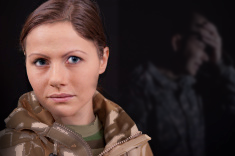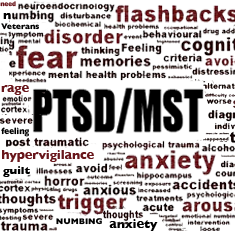 |
No Book Can Define What MST Is About How do you define what MST is about? Just imagine a 17 year old male, suddenly having to face the ordeal of an adult male forcing himself upon him to satisfy his own twisted sexual desires. That 17 year old was myself. One moment alone, then suddenly being grabbed from behind by an enlisted officer, holding me in a choke hold while simultaneously ramming his finger into my rectum. This was just the initial moment of an MST horror that would continue to occur for months to follow. For a male, rape and / or sexual molestation by a person of the same sex is one of the most traumatic events ever. Fear, flashbacks, anxiety attacks, rage, depression, and bad memories are but a mere essence of the traumatic effects incurred by the victim. The predator uses fear to create a sense of dominance, giving him a sense of control and authority. As time continues with his victim, his need for a more a larger level of physical and mental aggression increases until they reach a plateau. At this point it's then on to the next victim. The confusion of being taught to obey orders and respect your elders now was being combined with being ordered to satisfy the commands of a superior officer, or face punishment for refusing to obey orders, day after day. Refusal to obey orders resulted in serious punishment. A rifle butt into the side of your head, legs, spine or being knocked to the ground and kicked in the head or kideneys, or stronger punishment were standard. In today's military, many Veterans have it far worse!
Seeking Help Where There Was None As each week passed, the physical punishment evolved to an even greater degree, but so did my anger and desire to fight back. This evolved into my beginning to have fights with fellow enlistees. Once reaching a level of trauma that I overcame my fear of letting someone else know what was happening to me, I shared it with fellow enlistees. The general consensus was to speak to an officer or the chaplain about it. It was quickly assumed that sharing what was happening to me would be more than enough reason for an officer to act promptly about the matter. I quickly discovered that was wrong. Excuse after excuse was given to me by those I sought help from. The person I spoke to didn't want to risk his getting involved due to potential risk to his career or or a variety of other excuses. Even the chaplain told me there was nothing he could do about it. This left me with no option to seek help where there was none.
Life Goes on... The old line "Life goes on..." is a perfect statement to define life following the years to follow. For victims like myself, life truly goes on as the psychological trauma from past, influencing every aspect of your life. In my case, I tried to commit suicide in a head on collision while riding my motorcycle without a helmet. I chose to take that approach because I was ashamed of what happened to me; putting the blame upon myself. Instead of ending my life as intended, life went on for me...my mind began blocking my memories of the atrocities that were inflicted upon me. Following learning to walk and talk again, I couldn't keep a job. I couldn't maintain a relationship with a woman. I suffered from rage fits, anxiety attacks, depression, nightmares, migraine headaches, suicidal ideation and so much more. It seemed impossible to try and understand why this all was occurring. In 2015, with the help of Dr. Finn, who handled the MST Group at the Las Vegas VA Medical Center - Mental Health, my memory began to come back of what happened to me, over 40 years later. Memories flooded my mind not just of the physical injuries incurred, but the psychological trauma that molded my life for all the years to follow. There's nothing like suddenly remembering how a commioned officer told you and caused you to belive that if you had just gone with the flow, it would have been like an initiation and you could have gone on with your goal for a long-term military career. Life goes on.
Self Persecution and Lack of Trust While my own experience as a victim has been what seems at times an overwhelming challenge, it is but a mere ripple in a pond in comparison to other fellow Veterans. Some are victims of PTSD from battle or other reasons, while while others are victims of MST. We are seen at VA medical centers across the country, most often never getting the proper help we need!
Because of the lacking in full understanding by doctors of what PTSD / MST are and the resulting traumatic effects for both men and women, we continue for years, to suffer with self-persecution and lack of trust in anyone. We have to ask ourselves "How can one get help if you are not getting the proper treatment in the first place?" This feeds the anger and confusion creating the impression you are just going circles, never to see an end except perhaps through suicide for many. Proper Recognition and Treatment Both PTSD and MST are a mixed bag of tricks. Every victim has a mixed variety of event and psychological variables that created a traumatic effect upon each victim; no two exactly alike. This creates a challenge for medical professionals to be able to properly identify the symptoms. Despite the overwhelming increase of soldiers describing similar symptoms all the way back to World War 1 and continuing to present day, PTSD and MST were not recognized by the American Psychiatric Association until 1980. A perfect example of this is a personal experience with one of my previous SCI (Spinal Cord Injury) doctors. In my medical records one day, I read: "Patient is bi-polar and narcissistic." On my next appointment with the doctor, I brought it to his attention of how a person suffering from a bi-polar psychological disorder is either Bi-polar A, Bi-polar B, or both and with a specific category or categories. His response was "I'm not qualified to answer that question. You need to consult the mental health staff. If the doctor himself acknowledges his not being qualified to make the diagnoses he wrote, then why did he write it? Doctors in the future who read that will make assumptions that what they read is fact. Interactive Social Communication Is Vital
It is important to consider the fact that a victim of MST, is not responsible for their actions. For most victims, they have put up a wall to protect them from the traumatic experience they have endured. The normal flow of social neurons in their brains does not allow them to recognize and respond effectively. A Never Ending Story Veterans who are victims of PTSD alone or PTSD as a result of MST, both have to contend with a never ending story. There is good news to appreciate though. Their symptoms can be treated and managed more effectively. Now that there is a better understanding of what PTSD and MST are, there are specialists who not only help victims but truly care. One of the very best ways to start on the road to recovery is a PTSD or MST group. Same as the foundational idea of Alcoholics Anonymous or similar groups, in a PTSD / MST group you are with others who are also victims like yourself and one begins to realize you are not alone. Interactive social communication begins to flourish once again with others you form a bond of trust with. Theree is a positive side to practically everything if we simply just look for it. I might be in a wheelchair from the injuries incurred in the military, but while others are complaining while their backs are hurting while waiting for the next cashier at a store, I'm more relaxed in my wheelchair, using my iPad or enagaged in a phone call. While others might be pressed for time to walk all the way across a store for something they need, I simply roll across the floor at a good pace yet in a safe manner, without breaking a sweat. Although there is no cure so to speak for PTSD and MST victims, by stepping up and taking command of your life, it can change for the better. By striving to get the help you need, and making an honest effort to take each day, one at a time and living it as though it were your last, there is nothing to look forward to but a bright future in your life. It's all a matter of choice.
|
|||||||||||||||||||||








